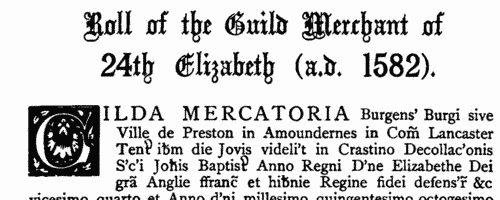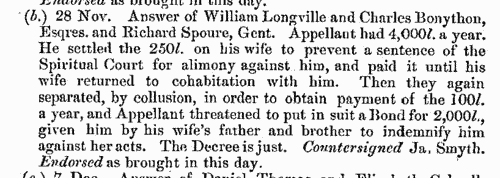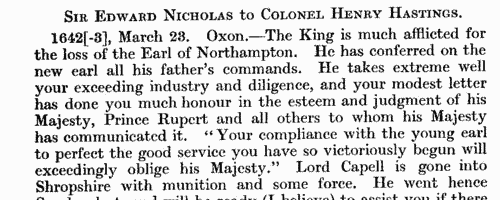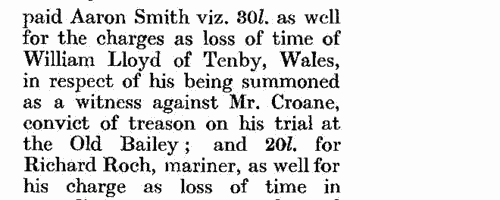Gant Surname Ancestry ResultsOur indexes 1000-1999 include entries for the spelling 'gant'. In the period you have requested, we have the following 185 records (displaying 21 to 30): Single Surname Subscription | | | Buying all 185 results of this search individually would cost £1,048.00. But you can have free access to all 185 records for a year, to view, to save and print, for £100. Save £948.00. More... |
These sample scans are from the original record. You will get scans of the full pages or articles where the surname you searched for has been found. Your web browser may prevent the sample windows from opening; in this case please change your browser settings to allow pop-up windows from this site. London Marriage Allegations
(1521-1610)
London, Essex and part of Hertfordshire lay within the diocese of London. In the later 17th century the individual archdeaconry courts issued marriage licences, but for this period the only surviving material is from the overarching London Consistory court. The main series of marriage allegations from the consistory court starts 7 December 1597, and these were extracted by Colonel Joseph Lemuel Chester; Colonel Chester then discovered earlier material, back to 5 January 1521, in Vicar-General's Books of the Principal Probate Registry. The notices in these books were much briefer, but as well as extending back so much earlier, they included additional material for 1597 onwards. All this he collated with the consistory court extracts, and the text was edited by George J. Armytage and published by the Harleian Society in 1887. A typical later entry will give date; name, address and occupation of groom; name, address and condition of his intended bride, and/or, where she is a spinster, her father's name, address and occupation. Lastly we have the name of the church where the wedding was going to take place; or the words Gen. Lic. signifying a general or open licence.GANT. Cost: £4.00.  | Sample scan, click to enlarge

| Wills proved at York: Names of Testators
(1627-1637)
The diocese of York comprised most of Yorkshire, and Nottinghamshire: the York Exchequer court was the ordinary probate jurisdiction for the Yorkshire part of the diocese, but some wills from Nottinghamshire and other parts of the province of York were also proved there. Dr Francis Collins compiled this index to the transcribed wills of the Prerogative and Exchequer Courts in the York registry proved from 1627 to 1637. The date on the left is that of probate; the testator's full name is then given (surname first), parish or place of abode, and sometimes occupation, and date that the will was executed; and volume and folio number where it the transcript commences. The Act Books were used by Dr Collins to supply deficiencies in the information from the transcripts.GANT. Cost: £2.00.  | Sample scan, click to enlarge

| Lancashire and Cheshire Marriage Licences
(1661-1667)
Licences for intended marriages in Chester archdeaconry, which covered Cheshire and Lancashire south of the Ribble (by far the most populous part of that county)GANT. Cost: £4.00.  | Sample scan, click to enlarge

| Allegations for marriages in southern England
(1660-1669)
The province or archbishopric of Canterbury covered all England and Wales except for the northern counties in the four dioceses of the archbishopric of York (York, Durham, Chester and Carlisle). Marriage licences were generally issued by the local dioceses, but above them was the jurisdiction of the archbishop, exercised through his vicar-general. Where the prospective bride and groom were from different dioceses it would be expected that they obtain a licence from the archbishop; in practice, the archbishop residing at Lambeth, and the actual offices of the province being in London, which was itself split into myriad ecclesiastical jurisdictions, and spilled into adjoining dioceses, this facility was particularly resorted to by couples from London and the home counties, although there are quite a few entries referring to parties from further afield. The abstracts of the allegations given here usually state name, address (street in London, or parish), age, and condition of bride and groom; and sometimes the name, address and occupation of the friend or relative filing the allegation. Where parental consent was necessary, a mother's or father's name may be given. The ages shown should be treated with caution; ages above 21 tended to be reduced, doubtless for cosmetic reasons; ages under 21 tended to be increased, particularly to avoid requiring parental consent; a simple statement 'aged 21' may merely mean 'of full age' and indicate any age from 21 upwards. These are merely allegations to obtain licences; although nearly all will have resulted in the issuing of the licence, many licences did not then result in marriage. GANT. Cost: £4.00.  | Sample scan, click to enlarge

| Suffolk householders
(1674)
Hearth tax was raised by assessing each householder on the number of chimneys to the dwelling. This provided a simple way to make a rough judgment as to the value of the dwelling: paupers were issued exemption certificates, but they too were listed at the end of each return. The returns were made by township, grouped by hundred. A complete copy of the hearth tax return for each shire was sent to the Exchequer: this is the return for Suffolk for Lady Day (25 March) 1674 (E 179/257/14) as printed in 1905 as Suffolk Green Book no xi, vol. 13. The numbers given are the numbers of hearths: where two or more people are grouped together with one number, it may be assumed that they were heads of separate households sharing a single building with that number of chimneys.GANT. Cost: £6.00.  | Sample scan, click to enlarge

| Burgesses of Preston, Lancashire, and other members of Preston guild merchant
(1397-1682)
Freedom of the borough of Preston was necessary to trade in the town. The guild merchant maintained rolls of the burgesses, which were renewed every Preston guild, held every twenty years. The surviving rolls from 1397 to 1682 were edited by W. Alexander Abram, and published by the Lancashire and Cheshire Record Society in 1884 (volume ix). Each roll contains, firstly, a list of In-Burgesses, i. e., burgess inhabitants of the town, with the names of any adult sons eligible by way of inheritance to the freedom; then Foreign Burgesses (Burgenses Forinseci), i. e., those persons living outside the town who had acquired the freedom, plus the names of any adult sons; finally, there is a list of those who were not burgesses by inheritance, but had purchased freedom of the town. The only women to appear in these lists are three ladies in 1397, who were perhaps widows of burgesses. The text covers the rolls for the guilds merchant held in 1397 (20 Richard II: pages 1 to 7), 1415 (7 Henry V: 7-11), 1459 (37 Henry VI: 11-15), 1542 (34 Henry VIII: 15-19), 1562 (4 Elizabeth: 20-31), 1582 (24 Elizabeth: 31-46), 1602 (44 Elizabeth: 46-65), 1622 (20 James I: 65-94), 1642 (18 Charles I: 94-123), 1662 (14 Charles II: 123-159), and 1682 (34 Charles II: 160-202).GANT. Cost: £4.00.  | Sample scan, click to enlarge

| Official Papers
(1683)
The State Papers Domestic cover all manner of business relating to Britain, Ireland and the colonies, conducted in the office of the Secretary of State as well as other miscellaneous records. This covers June to September 1683.
GANT. Cost: £4.00.  | Sample scan, click to enlarge

| House of Lords Proceedings
(1690-1691)
Private bills dealing with divorce, disputed and entailed estates: petitions, reports and commissions: naturalisation proceedings.
GANT. Cost: £4.00.  | Sample scan, click to enlarge

| Hastings family correspondence
(1528-1699)
John Harley of the Historical Manuscripts Commission was invited by Reginald Rawdon Hastings to examine his family's extensive archives at the Manor House, Ashby de la Zouche, in Leicestershire. Harley produced a detailed calendar, of which this is the second volume, published in 1930, Hastings himself having since died, and Harley having been killed at Gallipoli, the work being completed by his colleague, Francis Bickley. This volume covers four categories of the records: correspondence of the Hastings family 1528 to 1699; newsletters sent by professional reporters in London 1669 to 1693; papers relating to the Band of Gentlemen Pensioners, of which Theophilus 7th earl of Huntingdon was captaon, 1677 to 1685; and correspondence of the Rawdon family, 1641 to 1694, including papers of George Monck, afterwards Duke of Albemarle, when commanding in Ulster. GANT. Cost: £4.00.  | Sample scan, click to enlarge

| Treasury Books
(1702)
Records of the Treasury administration in Britain, America and the colonies, for 1702. Also includes Treasury minutes for early 1691; secret service accounts from 1689 to 1702, and accounts of the Civil List (royal expenditure) and army debts that had accumulated by the time of the death of king William III (8 March 1702).
GANT. Cost: £4.00.  | Sample scan, click to enlarge

|
Research your ancestry, family history, genealogy and one-name study by direct access to original records and archives indexed by surname.
|












